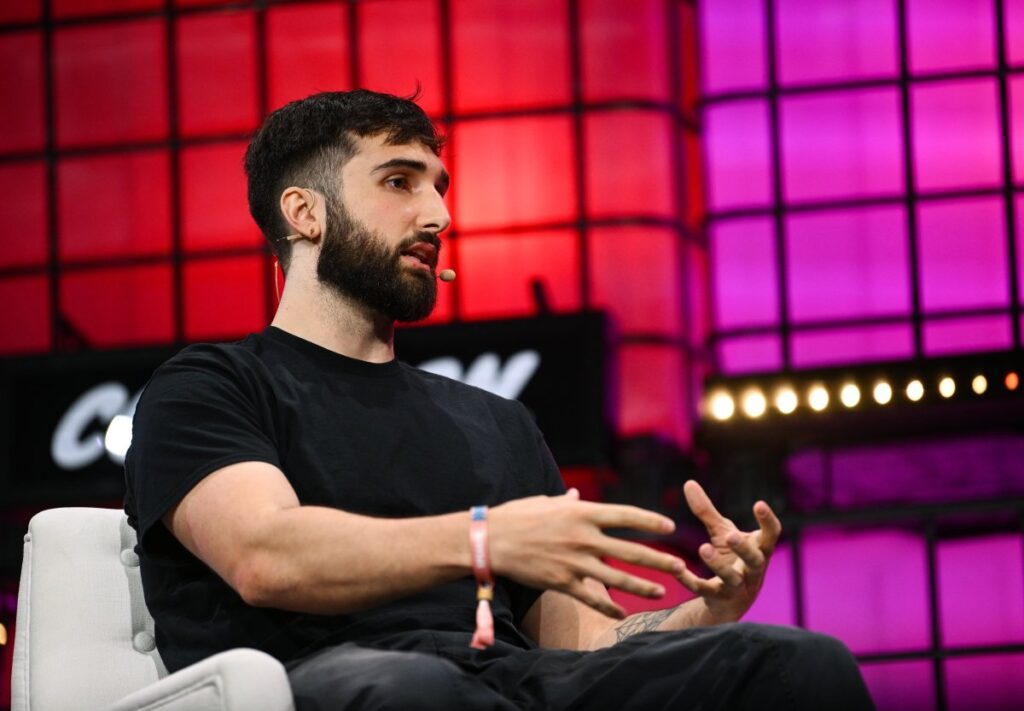
Rivian AI Strategy: EV Maker Appoints Cohere CEO to Board
Rivian AI Strategy: EV Maker Appoints Cohere CEO to Board
Reading Time: 5 minutes
Rivian R1S electric SUV showcasing the company’s advanced technology | Photo Credit: TechCrunch
The Rivian AI strategy is gaining significant momentum as the electric vehicle manufacturer has appointed Aidan Gomez, co-founder and CEO of generative AI startup Cohere, to its board of directors. This strategic addition, confirmed through a recent regulatory filing, signals Rivian’s ambitious plans to leverage artificial intelligence technology across its vehicle lineup and software platforms, positioning itself as a technology leader in the competitive EV market.
Table of Contents
- Strategic Board Appointment Signals Rivian’s AI Focus
- Who is Aidan Gomez? The AI Expert Behind Cohere
- Rivian’s $5.8 Billion Volkswagen Partnership
- Developing an AI Assistant for Rivian Vehicles
- Market Implications of Rivian’s AI Strategy
- Future Roadmap: How AI Will Transform Rivian
- Broader Impact on the Automotive Industry
Strategic Board Appointment Signals Rivian’s AI Focus
The Rivian AI strategy has taken a decisive step forward with the election of Aidan Gomez to its board of directors. According to a regulatory filing, Rivian increased the size of its board specifically to include Gomez, whose term will expire in 2026. This move represents more than just an addition to the company’s leadership team—it’s a clear statement about the direction Rivian is heading.
Rivian founder and CEO RJ Scaringe emphasized the significance of this appointment, stating that Gomez’s “thinking and expertise will support Rivian as we integrate new, cutting-edge technologies into our products, services, and manufacturing.” This statement underscores the central role AI will play in the company’s future.
The Rivian AI strategy appears to be two-pronged: enhancing its own vehicles with advanced AI capabilities while simultaneously positioning itself as a software leader and potential provider within the automotive industry. This dual approach could create multiple revenue streams and competitive advantages in the rapidly evolving EV market.
Who is Aidan Gomez? The AI Expert Behind Cohere
Aidan Gomez brings exceptional AI credentials to advance the Rivian AI strategy. As the co-founder and CEO of Cohere, a company specializing in training AI foundation models for enterprise applications, Gomez has established himself as a visionary in the field of artificial intelligence. Cohere currently provides AI services to major companies like Oracle and Notion, demonstrating the practical business applications of its technology.
Before launching Cohere in 2019 with co-founders Nick Frosst and Ivan Zhang, Gomez worked as a researcher at Google Brain, the deep learning division led by Nobel Prize winner Geoffrey Hinton. Perhaps most significantly, Gomez co-authored the groundbreaking 2017 technical paper “Attention Is All You Need,” which laid the foundation for many of today’s most advanced generative AI models.
Transformers and Modern AI
The paper co-authored by Gomez introduced the Transformer architecture, which revolutionized natural language processing and forms the backbone of models like GPT, BERT, and other large language models that power today’s generative AI systems. This expertise will be invaluable as Rivian AI strategy evolves to incorporate these technologies into vehicles and manufacturing processes.
Gomez’s deep understanding of AI foundation models and their practical applications places him in a unique position to guide Rivian’s integration of these technologies into both consumer-facing features and backend operations.
Rivian’s $5.8 Billion Volkswagen Partnership
A crucial element of the Rivian AI strategy involves its recently announced $5.8 billion joint venture with Volkswagen Group focused on software development. This partnership represents one of the largest collaborations between a traditional automotive giant and an EV startup, with significant implications for both companies.
Under this joint venture, Rivian will share its electrical architecture expertise with Volkswagen Group—spanning its numerous brands—and is expected to license existing intellectual property rights to the joint venture. The collaboration will likely accelerate the development of software platforms that leverage AI technologies, with potential applications across vehicle control systems, user interfaces, and autonomous driving features.
Beyond the Current Partnership
Industry analysts note that the joint venture could eventually evolve to sell its technology to other automotive companies, creating an additional revenue stream for Rivian beyond vehicle sales. This aligns with the broader Rivian AI strategy of positioning the company as both an EV manufacturer and a technology provider.
Gomez’s expertise in AI systems could prove invaluable in maximizing the value and capabilities of the software developed through this partnership, ensuring that Rivian maintains a technological edge even as it shares certain aspects of its architecture with Volkswagen.
Developing an AI Assistant for Rivian Vehicles
Beyond board appointments and partnerships, the Rivian AI strategy includes tangible product development in the form of an AI assistant for its electric vehicles. According to Rivian’s chief software officer, Wassym Bensaid, the company has been working on this assistant since 2023.
Importantly, Bensaid clarified in a March interview with TechCrunch that this AI work—specifically focused on the orchestration layer or framework for an AI assistant—sits outside the joint venture with Volkswagen. This suggests Rivian is maintaining certain proprietary AI developments as exclusive features for its own vehicles, potentially creating a competitive differentiation in the marketplace.
| AI Feature | Development Status | Potential Applications |
|---|---|---|
| AI Vehicle Assistant | In development since 2023 | Voice commands, personalization, predictive maintenance |
| Software Architecture | Part of VW joint venture | Vehicle control systems, OTA updates, ecosystem integration |
| Manufacturing AI | Exploratory phase | Production efficiency, quality control, supply chain optimization |
The addition of Gomez to Rivian’s board could accelerate the development of this AI assistant, potentially incorporating advanced generative AI capabilities similar to those offered by Cohere’s enterprise solutions. This could transform how drivers interact with their Rivian vehicles, creating more intuitive, responsive, and personalized experiences.
Market Implications of Rivian’s AI Strategy
The Rivian AI strategy positions the company at the intersection of two rapidly evolving industries: electric vehicles and artificial intelligence. This strategic positioning could have significant implications for Rivian’s market valuation, competitive stance, and long-term growth potential.
By emphasizing software and AI capabilities alongside its electric vehicle hardware, Rivian is attempting to differentiate itself from both traditional automakers entering the EV space and other electric vehicle startups. This approach mirrors Tesla’s successful strategy of positioning itself as a technology company rather than merely an automotive manufacturer.
Investor Perspective
Wall Street analysts have noted that companies that successfully integrate AI into their core products often command higher valuations due to the potential for recurring revenue streams, enhanced customer experiences, and more efficient operations. The Rivian AI strategy could therefore have positive implications for the company’s financial outlook.
Moreover, by establishing itself as a software provider through the Volkswagen joint venture and potentially beyond, Rivian could create additional revenue streams that complement its vehicle sales, potentially providing more stable income as the competitive landscape for electric vehicles intensifies.
Future Roadmap: How AI Will Transform Rivian
Looking ahead, the Rivian AI strategy is likely to manifest across multiple aspects of the company’s operations. In the near term, we can expect to see the introduction of the AI assistant in Rivian vehicles, providing enhanced voice control, personalization, and predictive features that improve the ownership experience.
Beyond consumer-facing applications, Rivian may leverage AI to optimize its manufacturing processes, supply chain management, and quality control. These behind-the-scenes applications could improve production efficiency and reduce costs, crucial advantages in the capital-intensive automotive industry.
- Predictive Maintenance: AI systems could monitor vehicle components and predict failures before they occur.
- Range Optimization: Machine learning algorithms could maximize battery efficiency based on driving patterns.
- Personalized User Experiences: AI could adapt vehicle settings based on individual preferences and habits.
- Autonomous Features: Advanced driver assistance systems could become more sophisticated with AI enhancements.
- Manufacturing Intelligence: AI could optimize production processes to increase efficiency and quality.
With Gomez’s expertise, the Rivian AI strategy could also expand to include more sophisticated applications of generative AI, potentially creating entirely new features and capabilities that have yet to be seen in the automotive industry.
Broader Impact on the Automotive Industry
The Rivian AI strategy represents part of a broader shift in the automotive industry toward software-defined vehicles where artificial intelligence plays a central role. As traditional automakers, tech companies, and EV startups compete to define the future of transportation, Rivian’s approach offers a compelling case study in how to leverage emerging technologies effectively.
If successful, Rivian’s integration of AI into its vehicles and business model could encourage similar initiatives throughout the industry, potentially accelerating the adoption of artificial intelligence across automotive design, manufacturing, user experience, and autonomous driving features.
As the boundaries between automotive and technology companies continue to blur, Rivian’s appointment of Aidan Gomez to its board signals not just a strategic move for the company, but potentially a glimpse into the future direction of the entire industry—one where expertise in artificial intelligence becomes as valuable as traditional automotive engineering skills.
With this bold Rivian AI strategy, the electric vehicle maker is positioning itself at the forefront of automotive innovation, seeking to transform how vehicles are built, how they function, and how we interact with them. As these initiatives develop further under the guidance of AI experts like Gomez, the automotive landscape may look increasingly different from the one we know today.





